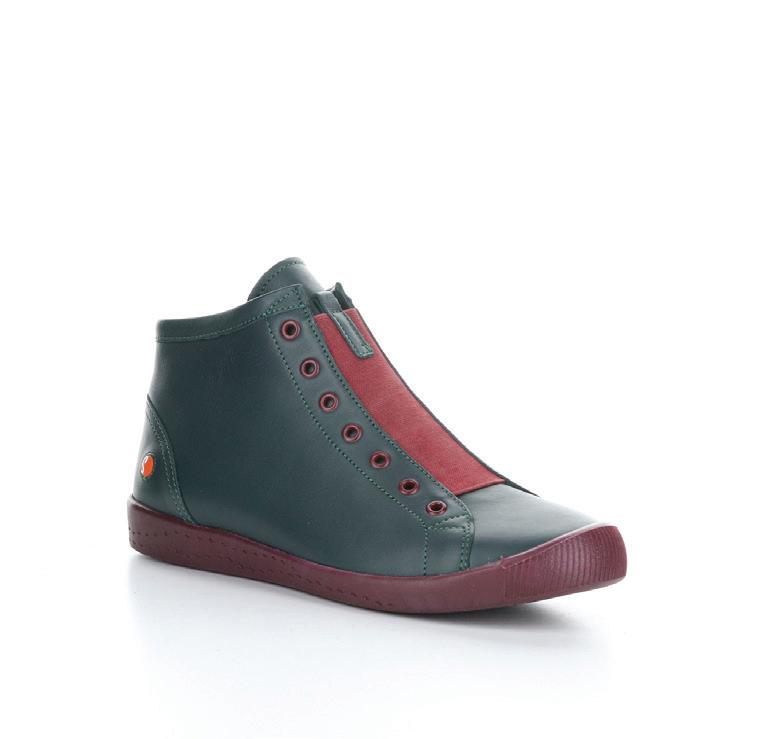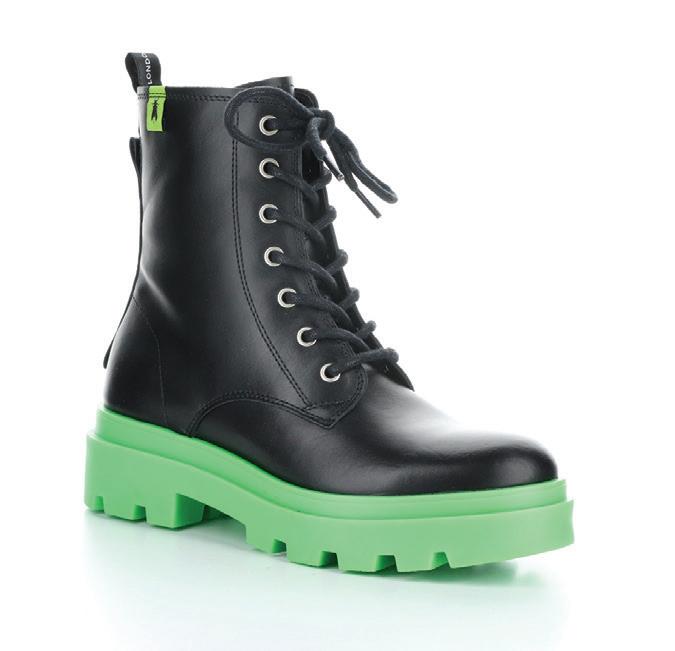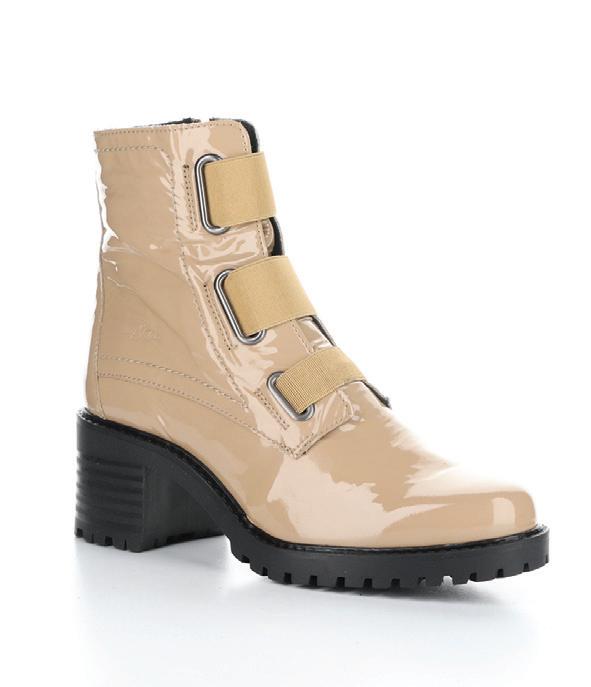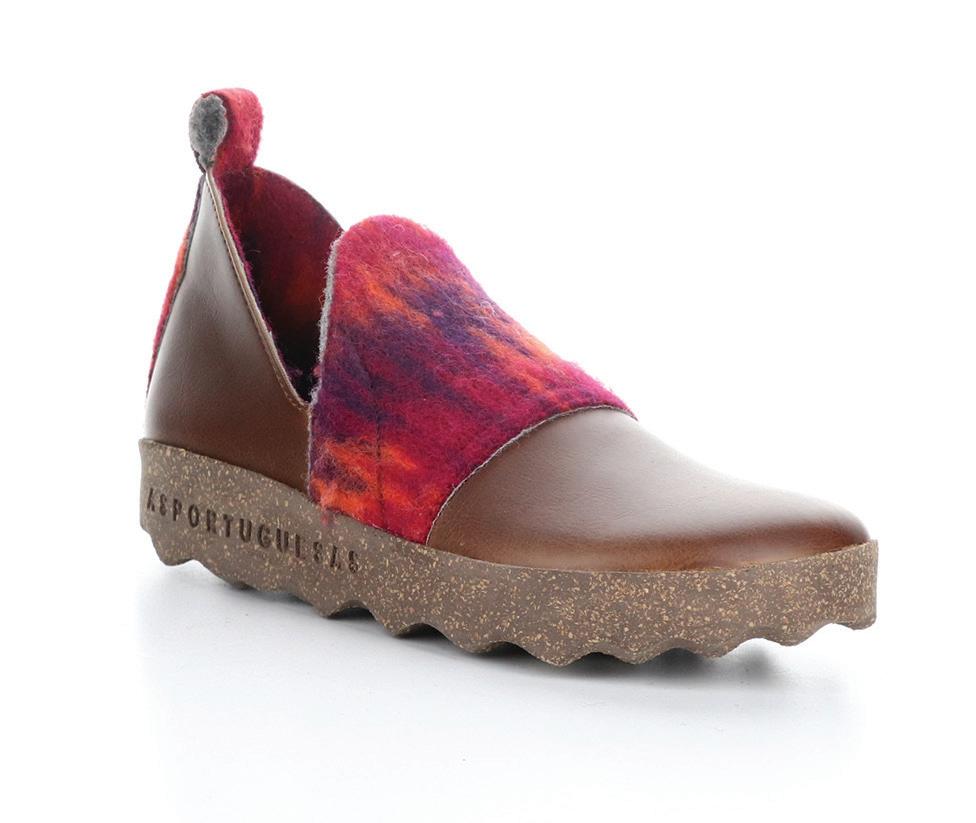
12 minute read
Upclose Comfort
Bos. & Co. Beat Goes On
The Canadian company’s comfort lifestyle portfolio is poised for strong growth in 2022.

BUSINESS WAS GOING gangbusters at Bos. & Co., makers of a namesake brand and Softinos as well as North American distributors of Aportuguesas and Fly London, leading up to the pandemic. In fact, the 46-year-old company reported record sales in 2019. And while 2020 was just about surviving, 2021 saw sales rise 28 percent over the prior year and fall just six percent short of that benchmark figure. Kevin Bosco, president and third generation family owner, can’t complain, all disruptions and general supply chain chaos considered.
“We’ve fared very well in 2021, and we’re very positive about the outlook for this year,” Bosco says. “Our Spring ’22 business is already up over 2019.”
A key factor fueling Bos. & Co.’s success actually began about two years prior to the pandemic hitting. That’s when the company began shifting sourcing from China to Portugal. By 2019, half of its production was being sourced in Portugal and by fall of 2020 it moved entirely. And while Bosco doesn’t admit to owning a crystal ball that foresaw the pandemic—one that has triggered record cost increases and delays in shipping from Asia—the company is in a far better position for the sourcing shift. “The supply chain seems to be a little less broken in Europe than other parts of the world,” he says. “The big slowdowns didn’t happen for us as all of our product comes into Montreal or New York. We’re talking a week or two delays on some shipments, whereas it’s been months on the West Coast.”
Even Europe’s higher production costs have been negated by lower shipping costs and the recent Canadian and European Union trade agreement that saw duties on footwear eliminated. “The prices in Asia were inching closer to what we saw in Europe,” Bosco says. “So we decided to focus on a story of European sourcing and quality, plus the fact that all our styling and development was already being done there and that we can ramp up production to meet growing demand.”
Bosco also cites the company’s decision to invest heavily in Fall ’21 inventory as contributing to its success while other vendors were conservative. “We took a rather aggressive position last March to buy stock, backing up as much as 30 percent on some items when we traditionally do 10 to 15 percent,” he says. “We felt that many retailers were playing it too safe. And the decision really paid off for us, because we had product available and the demand was definitely there.”
Of course, that strategy only works if you have shoes retailers want. And that’s where Bosco says the company’s investment in new products has paid big dividends. Fall ’22 is no different. “We’ve invested in a great many new silhouettes, outsoles and lasts in order to put fresh items on the table,” he says. “We believe that in these uncertain times a lot of companies might choose to rest on their laurels, but we feel it’s really important to also put fresh looks on the table.”
On that note, Bosco says there’s plenty of freshness across the portfolio to whet buyers’ appetites for Fall ’22. The menu kicks off with Asportuguesas, which features a bunch of new silhouettes and materials for the sustainablethemed brand. New styles include a Mary Jane, a wallabee and several boot silhouettes, while upper materials extend to an eco-friendly leather made of recycled food waste and a nylon-like upper made of recycled clothing polymers. Bosco says the brand is in stride with a remote working world and consumers looking to lessen their environmental footprint. “We had trouble keeping up with the demand this past fall,” he reports, noting that Asportuguesas is well on its way to becoming a year-round business. “We’re experiencing great results nationwide in outdoor specialty stores, and due to the shift in apparel trends brought on by the pandemic, we’re getting good distribution with our regular store accounts as well.”
Bos. & Co. is another brand that’s in step with the new normal. Once again, the strategy is to up the ante on fresh looks, led by new lightweight outsole constructions. The thicker soles featured in its Fifth collection also allow for more insulation to keep feet warm. (All Bos. & Co. boot styles are waterproof and lined with 100 percent Merino wool.) “The thicker the sole the more insulated it is, but these styles are super lightweight,” Bosco says. “‘Fashion with function’ is a key phrase for the brand.” Another key Bos. & Co. category for Fall ’22 is the Irina boots collection, which sits at a crossroads between rustic outdoor and dressy. Bosco calls it urban. “Dressier boots have fallen off the table as people stopped going to the office or events, and we believe this look falls into a sweet spot and expect it to be a nice growth area,” he says, adding that the Ariea collection of translucent and lighter colored outsoles fits this niche as well. As for the brand’s overall color palette, Bosco has taken cues from the European windows of late, which is heavy on khaki, beige, antelope, coffee and off-white. The story for Fly London is also new silhouettes, which build off the edgy brand’s wedges foundation. That includes the new expanded lightweight EVA wedge outsole in the Daze line that includes some colorful hi-top sneaker styles. Other Fly London trends of note: colored outsoles found in the Jeanette line of combat boots, the Pedalo collection’s lightweight wedges featuring incisor cuts in the front for “super flexibility” and Tetley line of urban casual footwear with new chunky soles. “Fly London is all about fun, casual footwear but with that added fashion edge,” Bosco says. “It continues to be a nice success story for us.”
Likewise, albeit on a smaller scale, is the success of Softinos. Bosco reports that the comfort brand is also benefitting from the new normal fashion shift. Softinos’ hallmarks of soft uppers and linings, slip-on constructions and removeable insoles is all about ease and comfort. The retro aesthetic is also spot-on. “A big part of our success is bright color combinations,” Bosco says, noting an expected best-seller is the Isba sneaker boot featuring a side zipper and elastic no laces construction. “It’s going to be Softinos’ No. 1 boot this fall, no question.” —Greg Dutter
Clockwise from top left: Bos & Co, Asportuguesas, Softinos and Fly London.


continued from page 27
and more product overall than at the beginning of 2021. “We had enough inventory for us to deliver record Q3 results, and we’re forecasting Q4 sales to be the strongest in the company’s history with enough products on hand,” he confirms.
How is that possible amid Asian factory shutdowns and the armada of container ships anchored off California? Worden credits the strength of Shoe Carnival’s merchant and vendor partnerships for keeping shelves stocked. “If something is going to be late, we get creative and try to figure out how to get it swiftly—through a port, on a truck, a rail, whatever it takes—to ensure our customers can shop our vendors when they are looking for it,” he says. “Because of those tight relationships and get-it-done spirit, we’re getting it done.”
PEOPLE POWER None of Shoe Carnival’s recent success—or any potential future gains—happens without its 5,000 to 6,000 employees, depending on the season, according to Worden. They are our “secret sauce” and difference maker. “That’s why we put customer experience, retention and training so high on our prioritization,” he says. “Those that skip such simple executions are going to stub their toe, or maybe not make it. The competition is too tough.”
It’s also why Worden says employee training and retention are critical areas of focus, especially amid the Great Realization. “We believe in providing our workers higher average hourly rates, and we’ve been on a multi-year journey to increase those rates to attract the best people,” he says. “We also believe people need time off, and we offer very generous levels for our store employees. Lastly, we offer a pretty robust benefits program.”
Worden ranks employee hiring and retention as concerns that can keep him up at night. (Another is supply chain challenges.) “The labor market has probably never been tighter, so we’re investing in programs to differentiate ourselves with work environments that employees enjoy and ultimately are career paths that they can grow with a growth retailer,” he says. “We take great pride in our training, development and ability to keep our people loyal.” In that regard, all Shoe Carnival general managers are homegrown, and the company’s employee tenure leads the industry.
Shoe Carnival’s commitment to its employees was perhaps best reflected when management decided not to furlough a single employee after the pandemic hit, even though the financial risks were huge. “That was a big, bold decision when we didn’t have s cash flowing in,” Worden says. “But we thought it was just the right thing to do as human beings—to be there for our 5,000-plus employees during that unknown time and keep them with a wage.”
That investment has paid huge dividends. Not only did Shoe Carnival get a massive head start on the competition when stores reopened, it has also generated a tremendous amount of employee loyalty. “In hindsight, the decision to stand with our people and to continue to employ them was probably the best decision of the entire pandemic so far,” Worden says.
The second-best decision? Not cancelling orders, according to Worden. And that goes beyond the obvious foresight that customers would eventually need new shoes. The decision to keep orders was also about Shoe Carnival not turning its back on its vendors in a time of great need. “We didn’t want to leave our vendors in the lurch—that’s just not good business,” Worden says. “It’s a true partnership. Otherwise, it’s just transactional.”
A third key decision? To continue focusing on retail, period. Shoe Carnival’s direct competitors can’t claim that. “Getting into manufacturing is not in our strategic plan,” he says. “We don’t have any interest in having those complexities.” That retail focus could expand beyond shoe formats in the years ahead. “We’re open to growth close-in or a little further away, but what we’re not open to is moving away from our core strength of retail,” he says. “We believe we’re experts at retail, we love retail and it’s all we want to do.”
That’s music to many vendors’ ears. “That makes them a great partner,” Kahan says. “Retail is all they do, and they have a talented team that’s hyper-focused market by market and door by door precision to achieve the best results.”
Worden believes being a partner and not a competitor means everyone is on the same page. “We have that shared perspective of treating brands as they want to be represented, as well as providing customers experiences with the best brands,” he says.
It’s a retail formula that AlixPartners’ Breuninger believes has legs, particularly Shoe Carnival. “With inflation at the highest levels since 1982, customers are likely to be price-sensitive and value-seeking,” he says, adding that the threat of inflation is unlikely to disappear soon. “Also, the family footwear segment lends itself well to a treasure hunt mentality among consumers. The search is for items that check the right boxes on style, brand and price, and that search is often easier—and more fun for kids—in a physical shopping environment.”
Worden believes Shoe Carnival offers the complete shoe shopping package. “We have the portfolio, price and service that you might have seen at a department store 20 years ago,” he says. “Customer can see at Shoe Carnival—and now at Shoe Station—that we’re singularly focused on offering the broadest and best assortment, at the right price, with an outstanding experience and service. Who wouldn’t want to go there?” •
Living the Dream
Shoe Carnival CEO Mark Worden is right where he wants to be: in retail.
MARK WORDEN GOT his start working in retail, nearly three decades ago, as a general manager for a multi-billion-dollar supermarket chain. That’s where he caught the bug. “I love retail,” he says. “It gave me a passion for sales and the customer.”
Specifically, it’s the immediacy and direct contact with end-users that Worden loves most. “I can see the fruits of my decisions that I make early in the week as soon as that weekend. I love that,” he says. “And if I see if it’s wrong, we can change it right then. That’s an inspiring job, and one I’m fortunate to have.”
While Worden’s 15 years of experience of also working in the package goods industries (for Kimberly-Clark and SC Johnson) gave him a love of brand building, strategy, innovation and technology, it reminded him of what he missed: retail. “There’s something so special about directly engaging with the customer,” he says, noting that the package goods’ planning to completion timeline can take years. “It’s so fulfilling and rewarding. I was thrilled to come back to retail in 2018.” That’s when Worden joined Shoe Carnival as Chief Strategy Officer and Chief Marketing Officer. Over the next nearly four years, he climbed the ranks, becoming President and Chief Customer Officer in 2019 and, this past September, named as Cliff Sifford’s successor as President and CEO.
Taking the reins of Shoe Carnival amid its rapid growth trajectory is a dream job for Worden. It marries his previous experience with a field (retail) he loves and in a category chock-full of incredible consumer brands. Indeed, it’s a labor of love. “I’m a builder,” Worden says. “I love growing brands, sales, profits and talented people’s careers. Shoe Carnival is perfectly poised for a builder to grow a billion-dollar brand into a multi-billion-dollar one in the years ahead. I’m excited and fortunate to be at the helm of this company at this pivotal moment in our trajectory.”
The fact that Worden’s career has organically led into the shoe industry is another dose of good fortune. “It’s an absolute blast of a category,” he says. “I’m an avid outdoors person and athlete, and I even like to get dressed up on occasion. Like so many people, there’s just a love of a good shoe.”—G.D.







